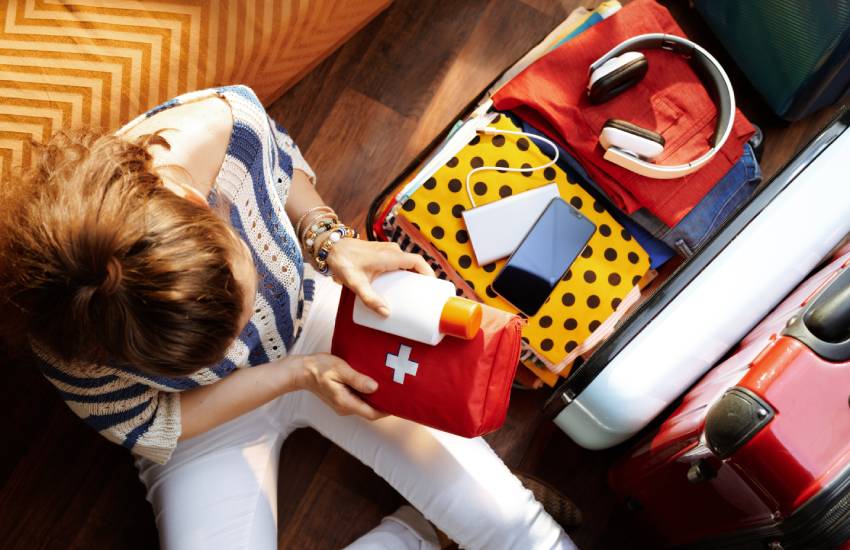Why travellers prefer Blue Cross
- Canada's #1 travel insurance brand and recognized worldwide
- Over 80 years of expertise in insurance
- $5 million travel insurance coverage, with or without deductible
- Flexible and affordable travel insurance solutions
- Free quote available online
- Travel assistance available 24/7 for any emergency, anywhere you travel

The complete first aid kit
Published on: July 25, 2019
Whether you prefer short outings or long trips, having a first aid kit that fits to your travel style is an essential element of travelling abroad. A first aid kit affords you some autonomy in dealing with minor scrapes without having to head to the local pharmacy. There are some basic items you should always include when preparing your emergency travel kit. Here are my recommendations as a travel nurse on what to include in your complete kit.
What to include in the first aid kit
Everyone has their own style of travel and your first aid kit should be adapted to the type of trip you’re taking. That being said, whether you’re headed for an all-inclusive vacation or going out backpacking, there are some things that every kit must have.
Essential medicines
- Acetaminophen and/or ibuprofen
- Antihistamines
- Antidiarrhea medication (for travellers’ diarrhea)
- Rehydration salts
- Antinausea medication
- Antibiotic ointment
- All prescribed medicines from your travel health consultation such as antibiotics, antimalarials, altitude sickness pills (acetazolamides), for example.
If you’re travelling with prescribed or over-the-counter medications, check out our tips on transporting them easily and hassle-free.
Some pharmacies sell ready-assembled travel first aid kits. You’ll want to make sure that a kit contains exactly what you need before you buy it.
Please don’t forget to advise Blue Cross of any change in your medications before you depart.
Essential medical supplies
- Thermometer
- Wound disinfectant
- Various sized adhesive bandages
- Tweezers
- Blister cushions
When I consult with patients prior to their departure, I remind them to think about how they treat things like disinfecting, cleaning, bandaging, etc., for minor cuts, scrapes and bruises. You should try that technique so you remember exactly what to pick up at the pharmacy.
Tips for travellers who will be far from health centres
If you’re travelling for a longer period, or if you don’t foresee having easy access to health care quickly on your trip, here are some other things you really should consider bringing with you in your first aid travel kit:
- Sterile gauze
- Medical adhesive tape
- Triangular immobilization bandage
- Adhesive bandages for stitches
- Tick removal tweezers
- Epinephrine pen
- Sterile needles and syringes (with accompanying medical authorization)
- Antifungal cream or ointment
If you know that access to pharmacy will be difficult, bring the over-the-counter medicines you’ll need for colds, headaches, allergies, nasal congestion, etc.
Some other stuff to think about
Trips inevitably have their surprises and unpredictable moments. So, I believe it’s best to include a little extra space in your travel kit, just to be on the safe side. Here are some of the other things you might want to pack with you:
- Antihistamine lotion (for insect bites)
- After sun lotion
- Cortisone ointment
- Water treatment pills
- Condoms
Once you’ve got all your stuff together, you just need to find a kit bag that will fit handily into your luggage, without taking up too much space. Now you’re ready to go!
Gabrielle Asselin